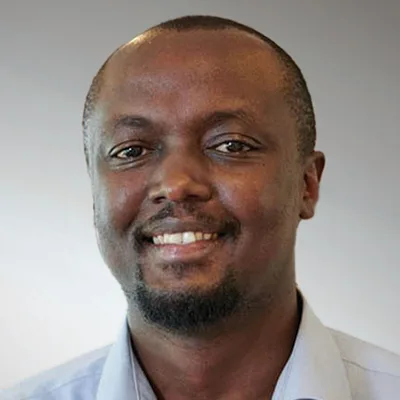A Most Intriguing Event with Ken Mbugua

God did not give us His Word so it would be known only by elite scholars. On this episode of 5 Minutes in Church History, Rev. Ken Mbugua joins Dr. Stephen Nichols to remember the foundational efforts made during the Reformation to translate the Bible into the languages of everyday people.
Stephen Nichols:
It’s a pleasure, once again, to welcome Reverend Kenneth Mbugua. He is the pastor of Emmanuel Baptist Church in Nairobi, Kenya, and the director of Ekklesia Africa, providing biblical resources for the church in Africa. We caught up with him at Ligonier’s National Conference in Orlando, and had a chance to talk to him about books that he would take with him on his deserted island. And you’re back. Thanks for being back with us.
Kenneth Mbugua:
Thank you for having me.
SN:
Let’s talk about an event in church history that has been impactful for you or for your ministry setting. We talk about the posting of the Ninety-Five Theses, and the American church talks about the Great Awakening all the time. Can you help us think of another event that you want to shine a spotlight on that has been impactful for you and your ministry?
KM:
Excellent. It would be the translating of the Bible into the vernacular languages. Whether that’s Luther trying to get it into German, and just doing so much to get that done. Taking a language that’s not been codified, organized, and doing all the necessary work.
SN:
Developing a grammar of a written language.
KM:
And all of that labor, simply to allow people to be able to open up the Bible, and read it in a language that they’re able to understand. William Tyndale laboring to do the same work in English, and even his statement . . . I can’t quote it. I’m too intimidated to quote it in front of a historian here. He’s defying the pope and all of his powers. And laboring, saying that, “I will basically labor to make the Scripture.” Or a little boy. Right? Pushing the plow.
SN:
The plowboy.
KM:
That the plowboy know more Scripture than the pope himself. So that labor of translating . . .
SN:
May I just pause you right here? You’re in very good company, Reverend Mbugua. Because when I put this question to none other than Dr. John MacArthur, he went right to Tyndale too.
KM:
Amen. Amen.
SN:
So you’re a great company.
KM:
I love the commitment, and even the conviction and confidence, that understands that what the church needs the most is the Scriptures. And when we’re denied the Scriptures, we’re denied everything.
SN:
Darkness descends upon the church.
KM:
And then I also love Tyndale’s burden for that common man. Christianity is not this thing that’s just for the elite, those who can read in Latin and Greek and the original languages.
SN:
The scholar.
KM:
The scholar. But he wants the plowman in the farm, out in the village, to know more Scripture than the pope. So as an African, I think Tyndale is our Reformer, because that really ought to be the desire. Not a continent that’s going to be filled with many elite. The cities have their elite. They have their scholars. But to be able to look at the continent and say for all our people, the greatest gift that we could give to them is the gift of the truth of the Scriptures. And allow them to be able to know the God of the Scriptures. Love the God of the Scriptures. Trust in the God of the Scriptures.
SN:
I love that you bring this up. We live in a moment where we’re literally surrounded by Bibles. I don’t even want to know how many Bibles I have in my home. And you think of, over the centuries, all those who did not have access to a Bible. Of course, from a divine perspective, we know that this was God at work. But from a human perspective, these were lifelong labors of these translators. And some of them paid with their very lives, for us to have God’s Word in our hands.
KM:
Yeah. The other reason I love William Tyndale is his very meager resources. He’s not a guy who is trapped in a castle with a prince, helping him with all the resources.
SN:
Like Luther.
KM:
Like Luther, but hiding in different places, moving up and down. I think at one time, actually, he may have lost a lot of his work and had to start over again. But again, as an African, we can so easily look to the West and think, “Oh, look. Look at the Ligonier National Conference.” This is called resources, right here. Right? And you can almost think, “Oh, we can’t really advance God’s work, because we are not like the West, and we don’t have all that.” No. William Tyndale was not in a situation where he had so many resources. And yet, he still put his heart, soul, mind, everything that he had, to do the hard work that [Dr. Steve] Lawson was encouraging us to do. To get the Bible into the hands of his people. And the Lord has used that work until today.
SN:
That’s great. Getting God’s Word into the hands of God’s people. Thank you for being with us.
Recent Episodes
Noah Webster: More Words
February 18, 2026|The Nineteenth Century
401 Again
February 11, 2026|The Ancient Church
401
February 4, 2026|General Church History
Noah Webster’s Dictionary
January 28, 2026|Biography
Early Methodism: Circuit Riders and Camp Meetings
January 21, 2026|American Church History
Early Methodism: Beginnings and Revival
January 14, 2026|The Eighteenth Century

